News Archives
USDA projects lower 2026 farm income, but slashes 2025 numbers
USDA projects net farm income, adjusted for inflation, will fall by $4.1 billion in 2026 to $153.6 billion.
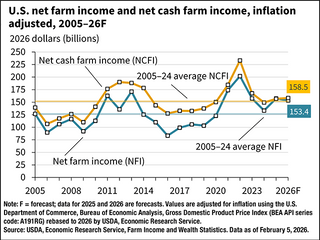
Ambassador Greer signs the United States–Argentina Agreement on Reciprocal Trade and Investment
Ambassador Jamieson Greer Thursday joined Argentina’s Minister of Foreign Affairs, International Trade, and Worship Pablo Quirno in signing the United States–Argentina Agreement on Reciprocal Trade and Investment (ARTI).

Texas cattle producers say proactive management is critical amid New World screwworm concerns
The northward advancement of New World screwworm continues to have Texas producers on edge.
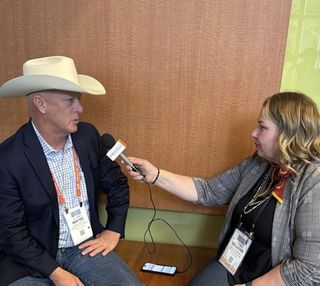
Congress must address farm labor crisis
The shortage of a skilled and reliable workforce is the single greatest threat to agriculture. That was the message American Farm Bureau Federation President Zippy Duvall delivered to leaders of Congress Thursday, describing the challenges facing more than 5 million Farm Bureau members across the country.
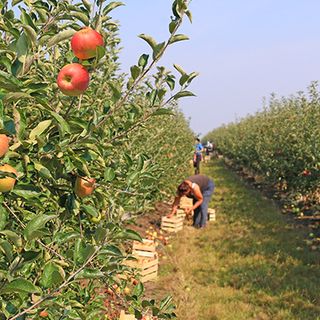
Soybean prices jump after Trump says China could buy more U.S. soybeans
The soybean markets moved higher after President Trump posted on social media China might more buy more ag products, including 20 million tons of soybeans in the current marketing year.
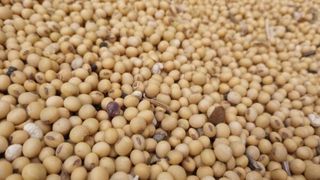
House committee investigates FFA over Syngenta partnership tied to Chinese ownership
The U.S. House Ways and Means Committee's oversight subcommittee launched an investigation into what three federal lawmakers say is the National Future Farmers of America Organization's alleged ties to the Chinese Communist Party through a partnership with Chinese-owned Syngenta Group.

November pork and beef exports below year-ago levels
Exports of U.S. pork remained relatively strong in November but were below the large total reported in November 2024, according to data released by USDA and compiled by the U.S. Meat Export Federation (USMEF).
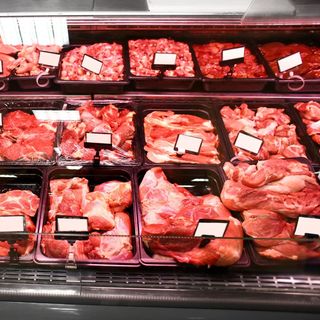
From the countryside to your couch: America’s farmers fuel your big game party
Sunday’s big game will be the main focus for millions of America’s families, but what they eat during the game will be a close second. The NFL championship represents the second-highest day of food consumption, behind only Thanksgiving.

Biofuel industry cheers 45Z tax credit proposal, awaits final details
The U.S. Treasury Department has issued its proposed guidance on the 45Z tax credit and biofuel supporters say it’s a good step forward.

Ag leaders issue a dire warning: Agriculture could face widespread collapse
A bipartisan group of former leaders of America's major agricultural commodity associations and biofuels organizations, farmer leaders, and former senior USDA officials sent congressional ag leaders a letter on Tuesday warning about the deteriorating state of the farm economy, stating there is a risk of "widespread collapse of American agriculture."
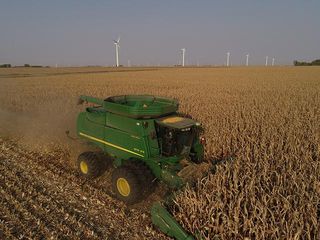
NGFA applauds extension of U.S. Grain Standards Act, urges full reauthorization
The National Grain and Feed Association (NGFA) Tuesday applauded Congress for passing the fiscal year funding package that includes an extension of the authorization for the U.S. Grain Standards Act (USGSA) through Sept. 30, 2026, providing critical continuity for the federal grain inspection and weighing system.

Farmer sentiment drops sharply at the start of 2026 as economic concerns increase
Farmer sentiment weakened sharply in January as the Purdue University-CME Group Ag Economy Barometer (AEB) Index dropped from 136 in December 2025 to 113 in January 2026 (see Figure 1).
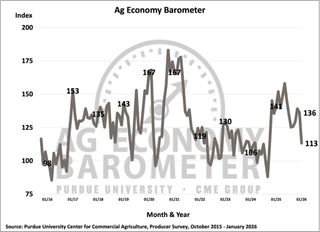
New EPA guidance blocks manufacturers from limiting farm equipment repairs
The U.S. EPA announced new guidance Monday that aims to protect farmers’ right to repair their own equipment.
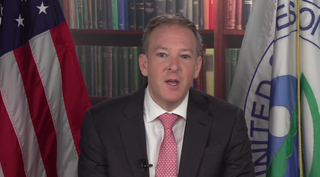
Five things to consider before adding SCO or ECO coverage for 2026
It's early in the game for thinking about crop insurance policy options for 2026 spring crops, but March 16 will be coming fast once price protection levels are set throughout February.

NCBA releases 2026 policy priorities at CattleCon
The National Cattlemen’s Beef Association (NCBA) today announced its 2026 policy priorities following approval by the organization’s Executive Committee at CattleCon 2026. NCBA’s focus centers on policies that directly impact producer profitability, including reducing regulatory costs, defending free markets, expanding trade opportunities, and maintaining strong beef demand.

El Salvador and Guatemala agreements strengthen protections for U.S. dairy exports
The National Milk Producers Federation, U.S. Dairy Export Council and Consortium for Common Food Names welcomed the United States’ signing of reciprocal trade agreements with El Salvador and Guatemala this week, underscoring the importance of reinforcing long-standing market access gains for U.S. dairy exporters and preventing the emergence of new trade barriers.
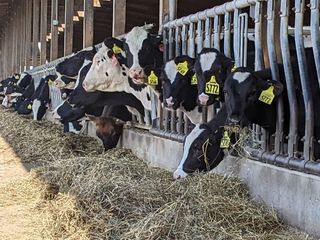
USDA Will Release Sterile Flies in Texas to Defend Against New World Screwworm
USDA's Animal and Plant Health Inspection Service (APHIS) has shifted sterile New World screwworm (NWS) fly release to include into Texas to help efforts to stop the northern spread of the pest.
.jpg?width=320)
RFA Thanks Trump Administration for Guatemala Agreement Boosting Ethanol Exports
The Renewable Fuels Association thanked President Donald Trump and U.S. Trade Representative, Jamieson Greer, for securing a reciprocal trade agreement with Guatemala that contains a requirement for 10 percent ethanol blends for on-road gasoline (E10), and a purchase commitment for at least 50 million gallons of American-made ethanol annually. The agreement also includes zero tariffs for U.S. agricultural products.

Contraction continues in the cattle industry
An ag economist says there’s still no signs of expansion in the cattle herd.
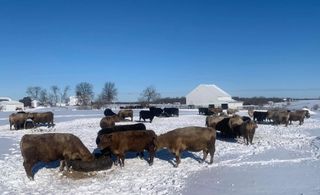
Agri-Pulse Newsmakers: Jan. 30, 2026: Food for Peace program, E15 with Sen. Jerry Moran
The Agriculture Department has temporarily taken over management of the Food for Peace program, which drives demand for U.S. commodities used as international food aid. We spoke with Kansas Sen. Jerry Moran about the program’s history and ties to Kansas, USDA’s commitment to distribute more than 200,000 tons of food aid by March, and his confidence that legislation could pass to permanently house the program at USDA.

CoBank Data Reveals Farmers Were Aggressive Sellers of Soybeans in Fall 2025
Farmers were aggressive sellers of soybeans last fall but were more reluctant to market corn and wheat, according to CoBank’s collateral monitoring reports of grain company customers as of Nov. 30, 2025.
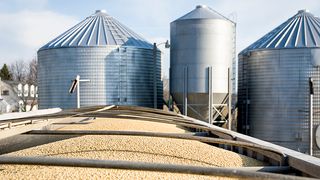
2025 Ethanol Exports Set a Second Consecutive Annual Record in Just 11 Months
According to data released today by the Census Bureau, 2025 U.S. ethanol exports through November totaled 1.96 billion gallons, already surpassing annual shipments of 1.94 billion gallons in 2024, which had smashed the previous record.
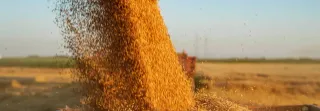
USDA trade mission highlights new market opportunities in Malaysia
The USDA’s Under Secretary for Trade and Foreign Agricultural Affairs says the agency has started the year leading some trade missions that could help expand market access for U.S. producers.
.jpg?width=320)
Friday's Cattle Inventory Report: 4 Reasons it Won't Look Like Cycles From the Past
Inarguably, the most highly anticipated cattle report of the year is set to be released this upcoming Friday, Jan. 30 -- the biannual Cattle Inventory report.
.jpg?width=320)
Farmers for Free Trade Announces National USMCA Roundtable Series in Congressional Districts Ahead of 2026 Agreement Review
Farmers for Free Trade announced a national series of USMCA roundtables that will bring together farmers, trade experts, and elected officials in congressional districts across the country to discuss the critical importance of strengthening and renewing the United States-Mexico-Canada Agreement ahead of its 2026 review period.
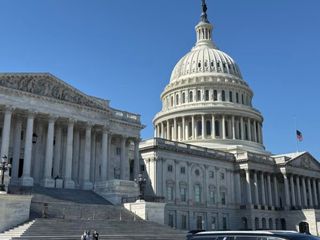
Seven Fertilizers Show Lower Prices Again; Urea Higher
TN retail fertilizer prices continue to be mostly cheaper compared to last month, according to prices for the third week of January 2026.
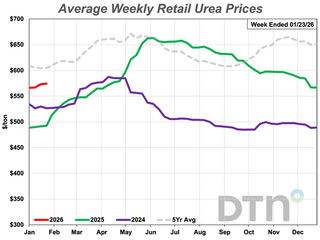
Nestlé announces two global collaborations to help scale regenerative agriculture and support the next generation of farmers
To accelerate the transition to regenerative agriculture and encourage young people to enter and lead the future of farming, Nestlé is working with The Nature Conservancy (TNC) and Goodwall globally.

Risk management advisor says get DMC coverage
A risk management and marketing advisor is advising dairy producers to enroll in the Dairy Margin Coverage program for 2026.




